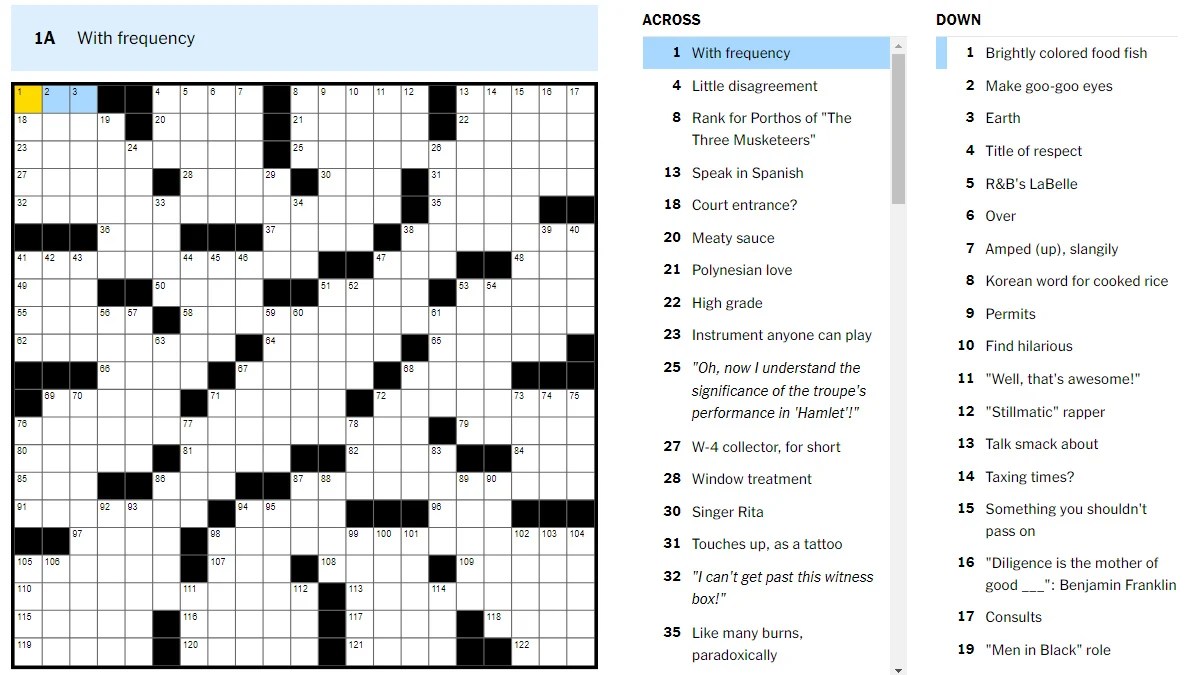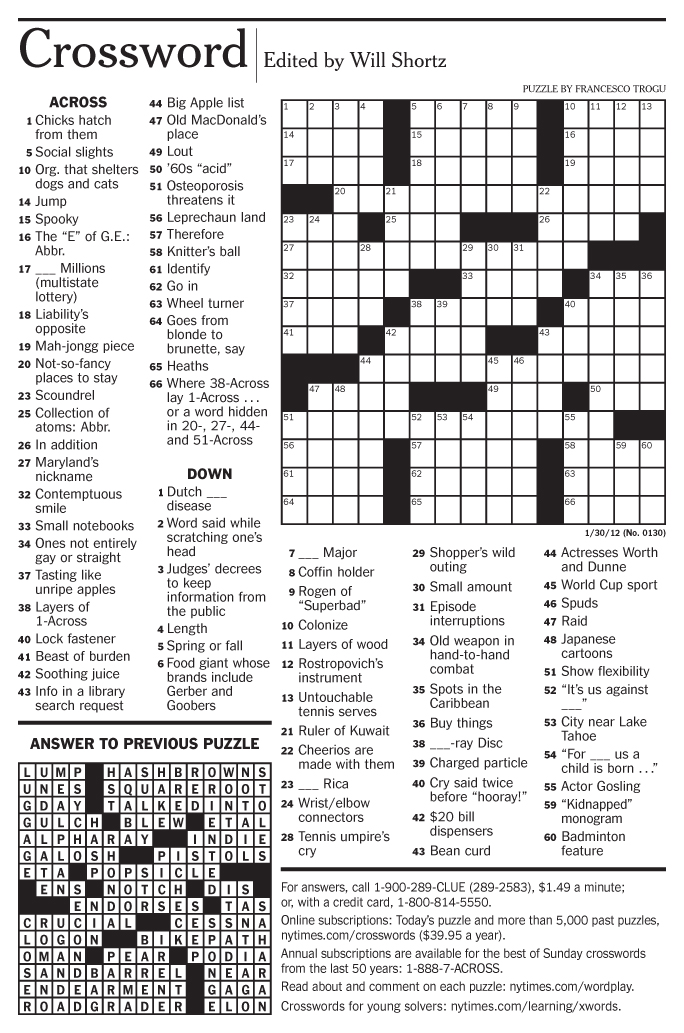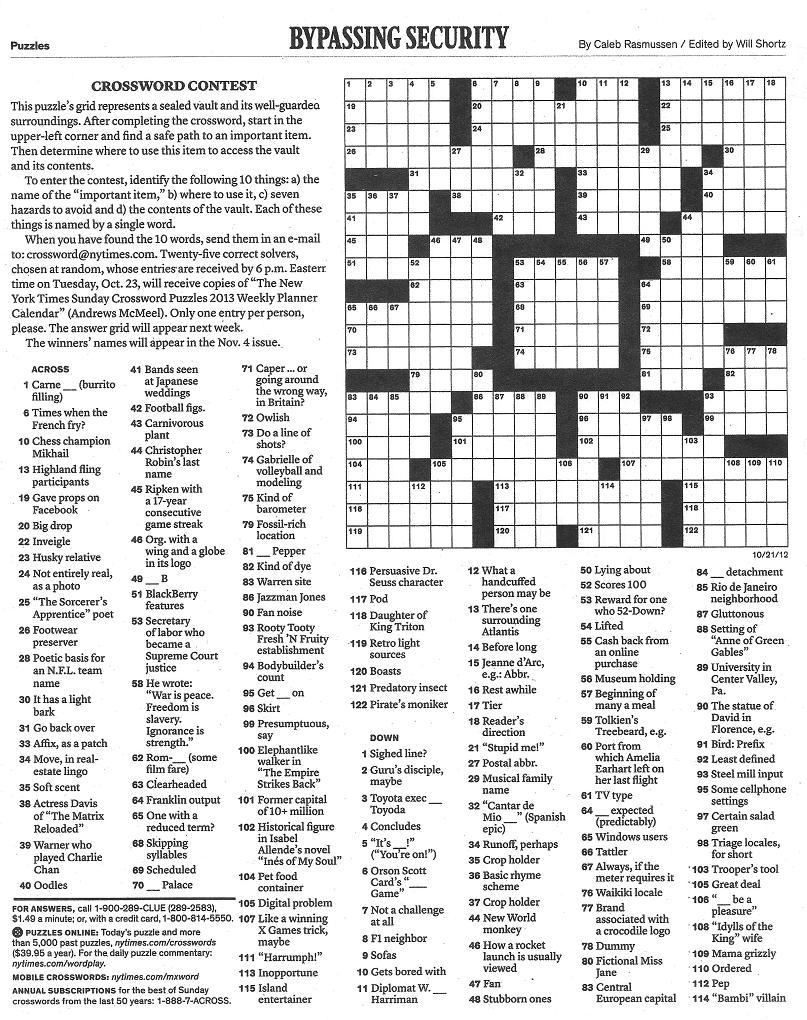The Allure of the New York Times Crossword
There's a certain ritual, a quiet moment carved out of the day, dedicated to the crisp black and white grid of the New York Times crossword. It's a familiar sight, a comforting challenge, whether you're a seasoned solver or a tentative beginner. The simple elegance of the design belies the complex web of words and clues within, a testament to the enduring appeal of this iconic puzzle.
The New York Times crossword, often referred to as simply "The Crossword," has become a cultural touchstone, a shared experience that transcends generations. Its influence can be seen everywhere, from casual conversations peppered with crossword lingo to its appearance in movies and television shows. But what is it about these enigmatic grids that holds such a captivating grip on our collective imagination?
From its humble beginnings as a Sunday pastime, the New York Times crossword has evolved into a daily ritual for countless enthusiasts. It's a mental workout, a vocabulary booster, and a source of both frustration and immense satisfaction. The increasing difficulty throughout the week, starting with the relatively straightforward Monday puzzle and culminating in the notoriously challenging Saturday edition, allows solvers to gradually test their skills and expand their knowledge.
The popularity of the NYT crossword puzzles isn't merely about filling in squares. It's about the thrill of the chase, the satisfaction of deciphering a particularly clever clue, and the sense of accomplishment that comes with completing a challenging grid. It's a mental game that sharpens cognitive skills, expands vocabulary, and provides a welcome escape from the daily grind.
The origin of the crossword puzzle can be traced back to the early 20th century, with the first published puzzle appearing in the New York World newspaper in 1913. The New York Times initially resisted the trend, viewing crosswords as frivolous, but eventually succumbed to their growing popularity, introducing its own crossword in 1942. Since then, the NYT crossword has become the gold standard, setting the bar for quality and ingenuity in puzzle construction.
One of the keys to the success of the NYT crossword is its clever use of wordplay and misdirection. Cryptic clues, double meanings, and puns are all part of the arsenal employed by the puzzle constructors, challenging solvers to think outside the box and explore the nuances of language.
Benefits of solving NYT crosswords include improved vocabulary, enhanced problem-solving skills, and a boosted memory. For example, encountering unfamiliar words in the puzzle often leads to looking up their definitions, expanding one's lexicon. The process of deciphering clues hones critical thinking and analytical skills. Regularly engaging with crossword puzzles can also contribute to better memory retention and cognitive function.
A simple action plan for engaging with NYT crossword puzzles could involve starting with the Monday puzzle and progressing through the week as your skills develop. Use online resources and crossword dictionaries to assist with challenging clues. Set aside a specific time each day for puzzle-solving to establish a routine.
Advantages and Disadvantages of NYT Crossword Puzzles
| Advantages | Disadvantages |
|---|---|
| Cognitive Stimulation | Time Consumption |
| Vocabulary Enhancement | Potential for Frustration |
| Improved Problem-Solving Skills | Limited Practical Application |
Five Best Practices: 1. Start with Monday puzzles. 2. Use a pencil. 3. Look for fill-in-the-blank clues. 4. Focus on themes. 5. Don't be afraid to use resources.
Real Examples: The infamous MARTHA STEWART clue, themed puzzles related to current events, puzzles featuring literary allusions, puzzles with tricky wordplay, and puzzles that incorporate pop culture references.
Challenges and Solutions: Difficulty level (start with easier puzzles), unfamiliar words (use a dictionary), tricky clues (look for wordplay), getting stuck (take a break), and time constraints (set realistic goals).
FAQs: What is the easiest day for the NYT crossword? (Monday) What is the hardest day? (Saturday) Are there resources to help solve? (Yes, online dictionaries and crossword solvers) What is a theme? (A recurring pattern in the answers) How can I improve my solving skills? (Practice regularly) What are some common crossword abbreviations? (See a crossword abbreviation guide) How are NYT crossword puzzles constructed? (By experienced puzzle constructors) How can I submit my own crossword puzzle? (Check the NYT submission guidelines)
Tips and Tricks: Look for fill-in-the-blank clues first. Pay attention to themes. Use abbreviations strategically. Try different solving strategies.
The enduring allure of the New York Times crossword lies in its unique blend of challenge and reward. From its humble beginnings to its current status as a cultural icon, the crossword has captivated millions with its intricate wordplay, its ability to test our knowledge, and its power to provide a welcome mental escape. Engaging with the NYT crossword puzzle, regardless of your skill level, offers a multitude of benefits, from expanding your vocabulary and sharpening your cognitive skills to simply providing a few moments of quiet contemplation and a sense of accomplishment. So, pick up a pencil, embrace the challenge, and experience the satisfaction of conquering the grid. The world of words awaits, offering a daily dose of mental stimulation and a timeless connection to a beloved pastime. Whether you're a seasoned solver or a curious beginner, the NYT crossword puzzle offers a unique opportunity to engage with language, challenge your mind, and become part of a rich and enduring tradition. Embrace the challenge, savor the satisfaction of a correctly filled-in square, and discover the joy of the crossword.
Childfree icons a look at famous figures without offspring
Unlocking early literacy a look at malay language resources for preschoolers
Toyota rav4 reviews decoding the hype

New York Times Printable Crossword | Innovate Stamford Now

Did Beethoven ever do a crossword puzzle | Innovate Stamford Now

Daily Quick Crossword Printable Version | Innovate Stamford Now

popular nyt crossword puzzles | Innovate Stamford Now

NYT Crossword October 17 2024 Answers 101724 | Innovate Stamford Now

Printable Nyt Crossword Puzzles Free | Innovate Stamford Now

Free Printable Nyt Crossword Puzzles Web Just Print It Up And Have Fun | Innovate Stamford Now

Free Nyt Crossword Puzzles Printable | Innovate Stamford Now

How to Finish a Crossword Puzzle 6 Steps with Pictures | Innovate Stamford Now

The New York Times Crossword | Innovate Stamford Now

Daily Themed Mini Crossword October 11 2024 Answers 101124 | Innovate Stamford Now

New York Times Crossword Printable Free | Innovate Stamford Now

NYT Crossword Puzzle Answer 14th September 2022 Check Detailed Answers | Innovate Stamford Now

Free daily difficult crossword puzzles | Innovate Stamford Now